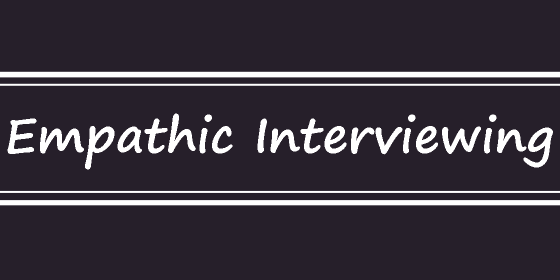Empathic Interviewing

Empathic interviewing is a qualitative research technique used to gain deep insights into the thoughts, feelings, and experiences of individuals or users. It involves conducting one-on-one interviews with a focus on building rapport, active listening, and empathizing with the interviewee’s perspective. The primary goal of empathic interviewing is to understand the interviewee’s emotions, motivations, and underlying needs to uncover valuable insights and inform the design or development process.
Key characteristics of empathic interviewing include:
- Empathy: The interviewer actively listens and demonstrates empathy towards the interviewee’s experiences, emotions, and challenges. This helps create a safe and comfortable environment for the interviewee to share openly.
- Open-Ended Questions: Empathic interviews rely on open-ended questions that encourage the interviewee to provide detailed and personal responses. These questions avoid leading or biased prompts, allowing the interviewee to share their thoughts in their own words.
- Non-Judgmental Approach: The interviewer maintains a non-judgmental and neutral stance throughout the interview. This encourages the interviewee to share their experiences without fear of criticism.
- Probing and Clarifying: The interviewer uses probing questions to delve deeper into specific topics or emotions. Clarifying questions may be used to ensure a clear understanding of the interviewee’s responses.
- Reflective Listening: The interviewer practices reflective listening by paraphrasing and summarizing the interviewee’s responses. This demonstrates understanding and allows the interviewee to clarify or expand on their thoughts.
- Respect for Privacy: Empathic interviews respect the interviewee’s privacy and confidentiality. Interviewees are informed that their responses will be kept anonymous and used solely for research purposes.
Empathic interviewing is particularly valuable in user-centered design, market research, and customer service. It helps designers and researchers gain a deeper understanding of users’ perspectives, motivations, and pain points. By empathizing with users, designers can identify unmet needs, design solutions that resonate with the target audience, and create products or services that address real user challenges.
Empathic interviewing is a qualitative research method, meaning that it focuses on exploring the richness and depth of individual experiences rather than gathering large-scale quantitative data. It complements other research techniques, such as surveys and usability testing, to provide a comprehensive understanding of users and inform design decisions effectively.